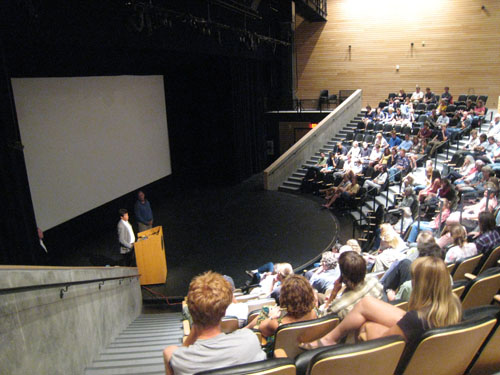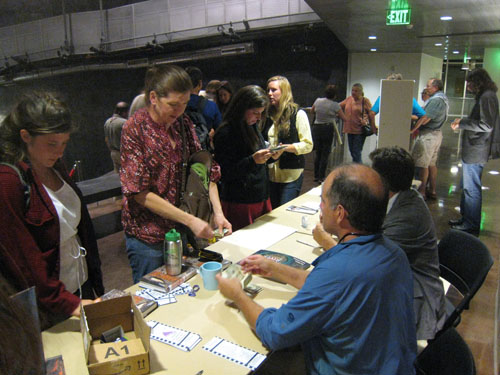In 1998, the Colorado River ran dry for the first time on its journey to Mexico’s Sea of Cortez, leaving 90 miles of dusty, cracked delta. Over a spec of time in human history, humankind turned a boiling, dynamic 1,450-mile natural wonder into a smelly, listless cappuccino pit at its delta.
This issue was addressed Monday during the kick-off to The Colorado College’s State of the Rockies Project 2011-12 Monthly Speaker and Conference Series. The series examines the use, restoration and sustainability of the Colorado River Basin.
Pete McBride, a nature photographer, and Jonathan Waterman, a nature writer, spoke at the campus’s Celeste South Theater in Colorado Springs, Colo., to about 450 students and guests about the river’s challenges. They also showed McBride’s 20-minute film, “Chasing Water,” and answered questions from the audience.
McBride and Waterman are no strangers to the Colorado River.
In May 2010, Waterman published “Running Dry: A Journey from Source to Sea Down the Colorado River,” which describes his 100 days paddling, with extended breaks, the snaking river from headwaters to delta between May 2008 and January 2009. Six months later, “The Colorado River: Flowing Through Conflict” was published, a 160-page coffee table book of astounding river photographs by McBride and text by Waterman.
Waterman told the audience how 80 percent of the river water is siphoned away for agriculture. He said agricultural laws in the seven Western states the river flows through need to be revisited, and asked whether it’s sustainable to raise cotton and cattle in a burning desert-like climate where water is so scarce.
Waterman also said that oil-shale development is being proposed by oil giants that would use an enormous amount of Colorado River water. Oil-shale development requires 5 gallons of water for every 1 gallon of oil mined, Waterman said.
McBride and Waterman asked the audience to be more aware of where they get their water (85 percent of Colorado Springs water is from the Colorado River, McBride pointed out) and that the resource is finite.
“When you ask too much of a limited resource, it disappears,” McBride said.
Each month through January, Colorado College’s State of the Rockies Project is presenting a speakers event on various issues that influence the Colorado River Basin. The next event is Oct. 17 at the Celeste South Theater in the Cornerstone Arts Building on the Colorado College campus in Colorado Springs, Colo.
The event is called “The Law of the Colorado River Basin: Rigid Relic or Flexible Foundation for the Future?” Speakers are Gregory Hobbs Jr., of the Colorado Supreme Court, and Larry MacDonnell, a professor at the University of Wyoming College of Law.
The Colorado River Basin speaker series is free and open to the public. For more information of the series, go to http://www2.coloradocollege.edu/stateoftherockies/.
by Mark Barna, State of the Rockies Project writer

